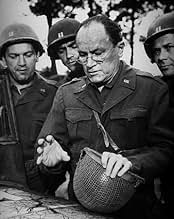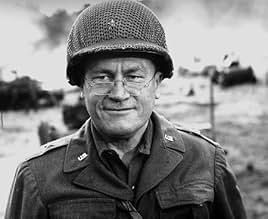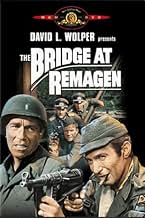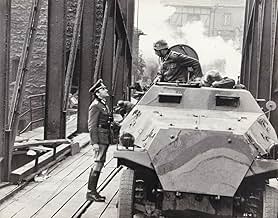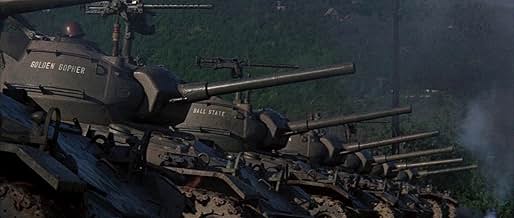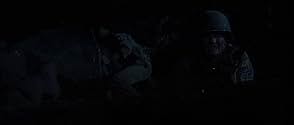IMDb RATING
6.7/10
11K
YOUR RATING
As the Allied armies close in, the Germans decide to blow up the last Rhine bridge, trapping their own men on the wrong side. But will it happen?As the Allied armies close in, the Germans decide to blow up the last Rhine bridge, trapping their own men on the wrong side. But will it happen?As the Allied armies close in, the Germans decide to blow up the last Rhine bridge, trapping their own men on the wrong side. But will it happen?
- Director
- Writers
- Stars
Peter van Eyck
- Gen. Von Brock
- (as Peter Van Eyck)
Anna Gaël
- French Girl
- (as Anna Gael)
Vít Olmer
- Lt. Zimring
- (as Vit Olmer)
- Director
- Writers
- All cast & crew
- Production, box office & more at IMDbPro
Featured reviews
This has to be one of the best war movies made in the 1960s, an era when all too often filmmakers went overboard in glorifying war while glossing over its horrors and populating their movies with larger-than-life hero characters who could have come straight out of a boys' comic. This movie doesn't fall into that trap. The characters - both German and American - are believable, and the movie sets and the equipment used (with the glaring exception of Korean War era American tanks) are authentic for the period. With so many WWII Sherman tanks and other vehicles still in museums, private collections and (at least back in the 60s) still in use in large numbers in the armies of several smaller countries, it has always been a puzzle to me as to why so many moviemakers took the simple option and used anachronistic military hardware in WWII movies, presumably assuming that the average moviegoer wouldn't even notice or wouldn't care. The most horrible example of this is the 1965 movie "Battle Of The Bulge". But I digress. Ignoring the tank factor, "The Bridge At Remagen" is a great movie. The best performance among many strong ones in this film has to be that of Ben Gazzara as Sergeant "Angel" Angelo, and the scene in which he kills the German sniper is extremely strong, moving stuff. Highly recommended.
This is a no-nonsense, gritty, thoroughly well made war film. As a recreation of war it is quite convincing, I couldn't spot anything wrong with the military equipment. The battle scenes are exciting and give a good, clear picture of the fighting instead of just chaotic shots of shooting and explosions. However, the people are never lost among the warfare. These are complex, solid characters, and the actors are good throughout. There is nothing superhuman, just individuals, very low on humanity or manners. Tired and ill-motivated Americans, desperate and scared Germans. Nothing glorious or patriotic: there is even a scene with American planes bombing refugees and Germans trying to protect them! This is not an adventure, more a depiction of an interesting situation and the people in it. However, the story flows on and there isn't a dull moment. Why this film hasn't acquired more recognition is beyond me. As a war film I think it is better than most of it's contemporaries, like "The Battle of the Bulge" or "Anzio".
Very under rated war epic. Why this movie isn't just as big as the other big war movies of the 60's(the guns of Navarro /bridge to far) is probably because it was to realistic for the times! acting is good only problem is that the Germans speak a little bit to good English but the action is topnotch especially the big tank battle scene in the middle of the movie, is one of the best war scenes i've ever seen till this day!!!The Bridge scene is also very impressive with tanks that destroy huge apartment blocks! this was a big budget movie at the time you can tell you can't count the extra's walking around and the destruction is as realistic as I've ever seen !!TRULY A MUST SEE FOR WAR MOVIE LOVERS!!!
'The Bridge at Remagen' has, for what ever reason, largely been lost or forgotten by today's movie-going public. I think this is a real shame because the sensibilities and attitudes that the film has toward it's own themes fit very much into the modern movie-goer's. Films like 'The Big Red One,' 'Saving Private Ryan,' 'The Thin Red Line,' and a host of other modern war films owe their dark edge to earlier films like 'The Bridge at Remagen.' 'The Bridge at Remagen' is about worn out soldiers. It is a film that doesn't like war, and stews in bitterness. George Segal's world weary eyes are matched only by Robert Vaughn's. Two men, one an American and the other a German who are trying less to kill the others forces than they are trying to just keep the men that they command. Segal has been ordered to capture the town around the bridge. He's told not to worry about the bridge because it is assumed that the Germans will have blown it up themselves by the time he gets there with his troops, or that the Allied air force will bomb it in order to trap and destroy the German 15th Army ... an army on the wrong side of the bridge. Vaughn, excellently playing the conflicted Major Kruger, is ordered to blow up the bridge. The 70,000 troops of the 15th Army and countless civilians are to be sacrificed at the greater expense of protecting Berlin. The General who gives Major Kruger the order to blow up the bridge suggests that holding the bridge for as long as possible so that fleeing troops and civilians can escape might not be a bad idea. This ultimately leads to tragedy for both sides.
The film is highlighted by worn out lower level officers who must command on the front lines, and the incompetent or uncaring officers who outrank them. These lower ranking officers and their men are merely pawns to be pushed beyond the breaking point and destroyed. The lower level officers see letters of condolence that they need to write for the families of the fallen men serving under them. The higher ranking officers see flags on maps. 'The Bridge at Remagen' is deeply cynical and highly embittered. Although it is in my mind superior in every way to similarly themed films like 'Anzio,' It was overshadowed and consumed by films with bigger budgets and star power. Need one look much further than 'A Bridge Too Far'? The two leads, Segal and Vaughn are both tremendous and are playing their parts in top form. Vaughn especially turns in some of the best work of his career.
The only real flaws in 'The Bridge at Remagen' aren't too serious, but they are strong enough to detract overall. The direction does lean toward heavy-handed pedantics and this can become aggravating. Only having a soldier standing in front of the camera and yelling "WAR IS BAD! WAR IS BAD!" over and over again would it have been more 'in your face.' The movie also suffers from some pacing issues, especially early on, although I think it is redeemed by the hard and gritty ending.
'The Bridge at Remagen' -- very much worth taking a look at if you can find it, and almost certainly belongs (with pride) on the DVD shelf of any serious WW2 film fan.
The film is highlighted by worn out lower level officers who must command on the front lines, and the incompetent or uncaring officers who outrank them. These lower ranking officers and their men are merely pawns to be pushed beyond the breaking point and destroyed. The lower level officers see letters of condolence that they need to write for the families of the fallen men serving under them. The higher ranking officers see flags on maps. 'The Bridge at Remagen' is deeply cynical and highly embittered. Although it is in my mind superior in every way to similarly themed films like 'Anzio,' It was overshadowed and consumed by films with bigger budgets and star power. Need one look much further than 'A Bridge Too Far'? The two leads, Segal and Vaughn are both tremendous and are playing their parts in top form. Vaughn especially turns in some of the best work of his career.
The only real flaws in 'The Bridge at Remagen' aren't too serious, but they are strong enough to detract overall. The direction does lean toward heavy-handed pedantics and this can become aggravating. Only having a soldier standing in front of the camera and yelling "WAR IS BAD! WAR IS BAD!" over and over again would it have been more 'in your face.' The movie also suffers from some pacing issues, especially early on, although I think it is redeemed by the hard and gritty ending.
'The Bridge at Remagen' -- very much worth taking a look at if you can find it, and almost certainly belongs (with pride) on the DVD shelf of any serious WW2 film fan.
American director John Guillermin, known for several epic "clunkers", pulls together this rather tense look at one of the most important battles of World War II: American forces clash with the Germans at Remagen, where the last intact bridge over the Rhine stands between the two opposing forces.
The script divides attention evenly and fairly between the two forces. George Segal ("The Longest Day") is Lt. Hartman, a burned out and pretty tired junior officer who doesn't want to accept the responsibilities of command when his company commander is killed. The war is almost over, and Hartman is concerned with getting his men home. On the other side of the river, German Major Kreuger (Robert Vaughn) is equally concerned with saving lives German lives. He becomes obsessed with keeping the bridge intact in order to allow retreating German soldiers to attack, despite orders from the High Command to blow up the bridge to prevent its' capture by the Allies.
The supporting cast is filled with fine performances. The standouts are Hans Christian Blech ("Battle of the Bulge") as Captain Schmidt, a weary Wehrmacht Officer who feels his duty is to protect the civilians whom Kreuger puts in harm's way by continuing a hopeless fight. Blech's acting ability ranges from quiet humility to occasional fits of rage, bringing a dimensionality to a role not commonly found in war epics. Joachim Hansen ("Breakthrough") disagrees with Schmidt; he is devoted to the High Command and wants a battle with the Americans more than anything. Both actors bring passion to their roles and make these very believable wartime officers, not simply normal caricatures and stereotypes.
Guillermin takes these characters and puts them in intense combat situations, making their humanity all the more believable. The best battle scene in the film has a platoon of American soldiers advancing onto the bridge under a smokescreen, but while they are in the open, the smoke begins to clear giving the Germans a clear field of fire. As some men are shot in the open, others move underneath the bridge to try and rip off as many explosives as they can before the Germans can ignite a secondary fuse to blow up the bridge.
In the aftermath of battle scenes like this, the human drama unfolds. Sgt. Angelo (Ben Gazzara, "Fireball Forward") is a tough GI who loots the bodies of the dead and sees the war around him as a chance to get rich and take the wealth home when it's all over. But when he must shoot a Hitler Youth member who is sniping at his men, then weeps when he realizes he has shot a mere pre-teenage boy. During a lull in the siege on the bridge, Hartman faces off with Maj. Barnes (Bradford Dillman), who wants him to take his men onto the bridge and capture it despite enemy fire and the threat of the bridge's imminent destruction. Hartman argues that he cannot risk the lives of his men; Barnes states that it will help to end the war faster is the bridge is captured, thus saving more lives in the end. It's a tough choice to make, and both decisions have their drawbacks.
The performances are complimented by three crucial technical elements: scoring, scenery and cinematography. Elmer Bernstein provides a sweeping score which resounds with the troops when they are victorious, yet mourns and seems to cry during some heart-wrenching scenes, such as an important scene between Angelo, Hartman and Schmidt at the film's conclusion. The Czech locations look magnificent the film looks and feels real because it was lensed in Europe, in a location which passes for Germany perfectly. The cobblestones streets, rustic villages, rolling hills and clear rivers look amazing. Finally, Stanley Cortez's cinematography is fantastic; the composition of every shot looks well-planned and detailed. There is action going on in the background and foreground most of the time. The focus is not just on the main characters, but as in real life, there is stuff going on around them. Scenes of the battle on the bridge are standouts, as the action is captured from every possible angle, it's very clear what's going on and who is where at all times.
"The Bridge at Remagen" is a fine World War II film which succeeds in showing history, American patriotism and the horrors of war at the same time. It will leave you feeling glad that the Allies won the war and agonized over the great cost of such small gains. But when you realize how much a "small" gain really matters in the big picture, it won't seem as small anymore.
The script divides attention evenly and fairly between the two forces. George Segal ("The Longest Day") is Lt. Hartman, a burned out and pretty tired junior officer who doesn't want to accept the responsibilities of command when his company commander is killed. The war is almost over, and Hartman is concerned with getting his men home. On the other side of the river, German Major Kreuger (Robert Vaughn) is equally concerned with saving lives German lives. He becomes obsessed with keeping the bridge intact in order to allow retreating German soldiers to attack, despite orders from the High Command to blow up the bridge to prevent its' capture by the Allies.
The supporting cast is filled with fine performances. The standouts are Hans Christian Blech ("Battle of the Bulge") as Captain Schmidt, a weary Wehrmacht Officer who feels his duty is to protect the civilians whom Kreuger puts in harm's way by continuing a hopeless fight. Blech's acting ability ranges from quiet humility to occasional fits of rage, bringing a dimensionality to a role not commonly found in war epics. Joachim Hansen ("Breakthrough") disagrees with Schmidt; he is devoted to the High Command and wants a battle with the Americans more than anything. Both actors bring passion to their roles and make these very believable wartime officers, not simply normal caricatures and stereotypes.
Guillermin takes these characters and puts them in intense combat situations, making their humanity all the more believable. The best battle scene in the film has a platoon of American soldiers advancing onto the bridge under a smokescreen, but while they are in the open, the smoke begins to clear giving the Germans a clear field of fire. As some men are shot in the open, others move underneath the bridge to try and rip off as many explosives as they can before the Germans can ignite a secondary fuse to blow up the bridge.
In the aftermath of battle scenes like this, the human drama unfolds. Sgt. Angelo (Ben Gazzara, "Fireball Forward") is a tough GI who loots the bodies of the dead and sees the war around him as a chance to get rich and take the wealth home when it's all over. But when he must shoot a Hitler Youth member who is sniping at his men, then weeps when he realizes he has shot a mere pre-teenage boy. During a lull in the siege on the bridge, Hartman faces off with Maj. Barnes (Bradford Dillman), who wants him to take his men onto the bridge and capture it despite enemy fire and the threat of the bridge's imminent destruction. Hartman argues that he cannot risk the lives of his men; Barnes states that it will help to end the war faster is the bridge is captured, thus saving more lives in the end. It's a tough choice to make, and both decisions have their drawbacks.
The performances are complimented by three crucial technical elements: scoring, scenery and cinematography. Elmer Bernstein provides a sweeping score which resounds with the troops when they are victorious, yet mourns and seems to cry during some heart-wrenching scenes, such as an important scene between Angelo, Hartman and Schmidt at the film's conclusion. The Czech locations look magnificent the film looks and feels real because it was lensed in Europe, in a location which passes for Germany perfectly. The cobblestones streets, rustic villages, rolling hills and clear rivers look amazing. Finally, Stanley Cortez's cinematography is fantastic; the composition of every shot looks well-planned and detailed. There is action going on in the background and foreground most of the time. The focus is not just on the main characters, but as in real life, there is stuff going on around them. Scenes of the battle on the bridge are standouts, as the action is captured from every possible angle, it's very clear what's going on and who is where at all times.
"The Bridge at Remagen" is a fine World War II film which succeeds in showing history, American patriotism and the horrors of war at the same time. It will leave you feeling glad that the Allies won the war and agonized over the great cost of such small gains. But when you realize how much a "small" gain really matters in the big picture, it won't seem as small anymore.
Did you know
- TriviaFilming in Czechoslovakia was interrupted by the Soviet invasion of August 1968. Cast and crew were taken to safety in a convoy of 28 taxis, except for Robert Logan, who stayed behind with film gear in order to capture the invasion on film and photo. According to the book "Bill Collins Presents The Golden Years of Hollywood," a half-replica of the bridge was built near Castelgandolfo, the Pope's summer residence south of Rome, and the film was completed in Hamburg (Germany) and various Italian locations. In 2007, BBC Radio aired "Solo Behind The Iron Curtain" a drama based on the invasion, starring Robert Vaughn as himself.
- GoofsAs the bridge comes under fire, there is a German train approaching the bridge from one side as American tanks approach from the other. The American tanks open fire on the train and it explodes. However, the train then comes to an immediate halt. Real trains have an immense amount of momentum and require a considerable distance to come to a complete stop. The train we see explode is undoubtedly a scale model, but it should have been allowed to continue moving forward after having been hit.
- Quotes
[Kreuger is offered a last cigarette before he is executed by firing squad. He and the Nazi Officer hear planes]
Major Paul Kreuger: Ours or theirs?
Nazi Officer: Enemy planes, sir.
Major Paul Kreuger: But who is the enemy?
- ConnectionsFeatured in An Officer and a Movie: Bridge at Remagen (2011)
- How long is The Bridge at Remagen?Powered by Alexa
- Chicago Opening Happened When?
Details
Contribute to this page
Suggest an edit or add missing content



